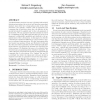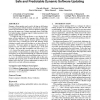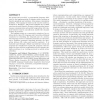687 search results - page 69 / 138 » Feature (De)composition in Functional Programming |
TLDI
2005
ACM
15 years 8 months ago
2005
ACM
Coordinated data structures are sets of (perhaps unbounded) data structures where the nodes of each structure may share types with the corresponding nodes of the other structures....
234
Voted
POPL
2005
ACM
16 years 2 months ago
2005
ACM
Dynamic software updates can be used to fix bugs or add features to a running program without downtime. Essential for some applications and convenient for others, low-level dynami...
139
Voted
PPDP
2005
Springer
15 years 8 months ago
2005
Springer
We present ReactiveML, a programming language dedicated to the implementation of complex reactive systems as found in graphical user interfaces, video games or simulation problems...
337
Voted
ICFP
2009
ACM
16 years 3 months ago
2009
ACM
re a popular form of abstract computation. Being more general than monads, they are more broadly applicable, and in parare a good abstraction for signal processing and dataflow co...
138
Voted
ICFP
2008
ACM
16 years 2 months ago
2008
ACM
Transactional events (TE) are an approach to concurrent programming that enriches the first-class synchronous message-passing of Concurrent ML (CML) with a combinator that allows ...



